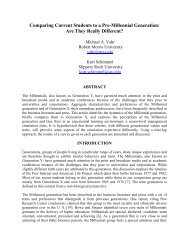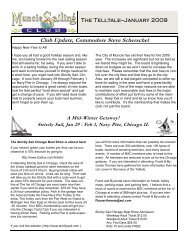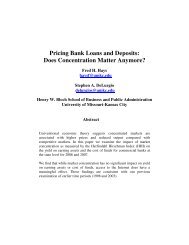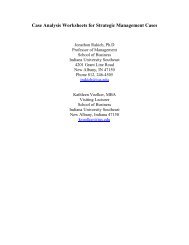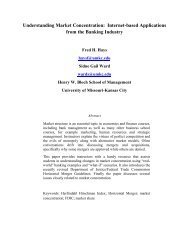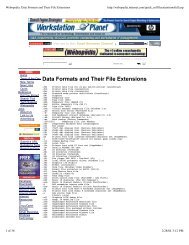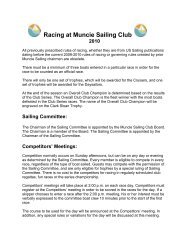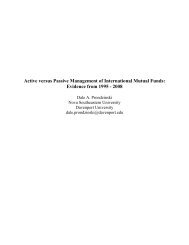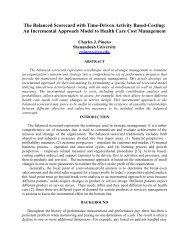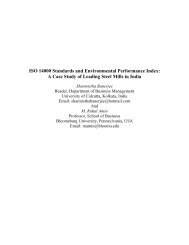Table 4 shows that there are significant differences between export<strong>in</strong>g firms and nonexport<strong>in</strong>gfirms at p < 0.05 with respect to bureaucracy, foreign competition, exchange rates, corruption,and <strong>in</strong>frastructure (roads and power supply) export<strong>in</strong>g firms and their counterparts. As depicted<strong>in</strong> Tables 5 export<strong>in</strong>g firms have higher means than their counterparts. Hypotheses 3 and 4 arelargely supported. Overall, <strong>in</strong> hypotheses 4 and 5 the export<strong>in</strong>g firms have higher means scoresthan the non-export<strong>in</strong>g firms.DISCUSSIONThe purpose of this exploratory research is to <strong>in</strong>vestigate barriers h<strong>in</strong>der<strong>in</strong>g small bus<strong>in</strong>essesfrom enter<strong>in</strong>g the export market. From the results of the study, one may conclude that there arevarious obstacles fac<strong>in</strong>g SMEs who want to participate <strong>in</strong> export markets. These barriers <strong>in</strong>clude(lack of f<strong>in</strong>ance, lack of qualified personnel for export activities, unwill<strong>in</strong>gness of banks supportexport activities, fear of foreign competition, lack of productive capacity, poor <strong>in</strong>frastructure,corruption, bureaucratic bottlenecks, and lack of knowledge on how to export). With respect tolack of knowledge, export knowledge can be described as dependent on the relevance and depthof <strong>in</strong>formation available to the firm.Concern<strong>in</strong>g f<strong>in</strong>ancial support for develop<strong>in</strong>g export markets, many of the firms’ surveyed fir thisstudy <strong>in</strong>dicated that lack of timely and adequate work<strong>in</strong>g capital constitute a problem for them.This not only adds costs but can also endanger the entire production operation. With regard topersonnel issue, the success of the firm’s export activities depends on the attitudes andcharacteristics of its staff. <strong>Export</strong> knowledge barriers can be attributed to a large extent to thelack of tra<strong>in</strong>ed and experienced personnel. The majority of the respondents <strong>in</strong>dicated the lack ofqualified decision makers was a barrier to export participation. We found that firms who havequalified personnel to handle export activities were more engaged <strong>in</strong> export markets than thosewho did not have qualified staff. One may therefore surmise that well tra<strong>in</strong>ed personnel areessential for export development.With reference to external barriers, a substantial number of export<strong>in</strong>g problems are said to berooted <strong>in</strong> the external environment. The nature of these problems tend to vary widely: dist<strong>in</strong>ctiveforeign consumer preferences, unfamiliar bus<strong>in</strong>ess protocols and practices, regulatory importcontrols by overseas fierce competition, exchange rate fluctuations and limited hard currency for<strong>in</strong>ternational trade. In order to develop a proper export market<strong>in</strong>g strategy, solutions relat<strong>in</strong>g tothese obstacles must be found.F<strong>in</strong>ally, export<strong>in</strong>g requires knowledge about export procedures. One of the most th<strong>in</strong>gsmentioned by the respondents as a major obstacles to export<strong>in</strong>g concerns the time and paperworkrequired to comply with foreign and domestic market regulations. Governments do not solelyimpose these procedural requirements. Also <strong>in</strong>dependent organizations such as banks, shipp<strong>in</strong>gand <strong>in</strong>surance companies, have their own procedures. Reduction <strong>in</strong> time a paperworkrequirements may encourage nonexporters to engage <strong>in</strong> export markets.
CONCLUSIONS AND IMPLICATIONSThis exploratory study has attempted to <strong>in</strong>vestigate the perceptions of a number of factorsimped<strong>in</strong>g the development of export activities of manufactur<strong>in</strong>g firms <strong>in</strong> Nigeria. This is an issueof paramount importance <strong>in</strong> <strong>in</strong>ternational bus<strong>in</strong>ess and economic development of a develop<strong>in</strong>geconomy like Nigeria s<strong>in</strong>ce the way these barriers are perceived by export<strong>in</strong>g and non-export<strong>in</strong>gfirms often determ<strong>in</strong>es their future engagement and performance <strong>in</strong> <strong>in</strong>ternational bus<strong>in</strong>essactivities. The study revealed that <strong>in</strong>creas<strong>in</strong>g competition <strong>in</strong> world markets, coupled with the<strong>in</strong>ability to offer competitive prices abroad, were the two most serious barriers to export activity.The limited availability of foreign market <strong>in</strong>formation also constituted a major impediment,contribut<strong>in</strong>g to a higher level of uncerta<strong>in</strong>ty surround<strong>in</strong>g <strong>in</strong>ternational bus<strong>in</strong>ess operations.Various implications are derived from the f<strong>in</strong>d<strong>in</strong>gs of the present study which concern policymakers, bus<strong>in</strong>ess executives and researchers. With regard to policy makers, certa<strong>in</strong> policymeasures should be taken <strong>in</strong> order to reduce or alleviate the perceived <strong>in</strong>hibit<strong>in</strong>g impact ofbarriers on manufactur<strong>in</strong>g firms. Particular emphasis should be given, for example, to theimprovement of competitiveness of <strong>in</strong>digenous firms, the supply of <strong>in</strong>formation for thelocation/analysis of foreign markets and the provision of various tax and other f<strong>in</strong>ancial<strong>in</strong>centives. These programs should be designed accord<strong>in</strong>g to the specific organizationalrequirements of export<strong>in</strong>g and non-export<strong>in</strong>g firms. For <strong>in</strong>stance, foreign market-related<strong>in</strong>formation should be directed more to firms with relatively few years <strong>in</strong> bus<strong>in</strong>ess, while theprovision of f<strong>in</strong>ancial assistance should target smaller rather than larger firms.At the managerial level, efforts should be made to m<strong>in</strong>imize the <strong>in</strong>hibit<strong>in</strong>g effect of exportbarriers (particularly those of <strong>in</strong>ternal orig<strong>in</strong>) on pre-export behavior, us<strong>in</strong>g various managementconsultancy and advisory services. These should aim at assist<strong>in</strong>g managers <strong>in</strong> non-export<strong>in</strong>gorganizations to improve managerial skills, formulate sound export market<strong>in</strong>g strategies,understand the mechanics of export<strong>in</strong>g, and learn how to handle export documentation and soforth. Moreover, various professional bus<strong>in</strong>ess sem<strong>in</strong>ars undertaken by chambers of commerce,trade associations and other similar organizations should stress the benefits derived from exportsthrough the illustration, for example, of successful cases <strong>in</strong> export<strong>in</strong>g. Particular emphasis shouldbe placed on smaller and <strong>in</strong>experienced firms which, ow<strong>in</strong>g to their <strong>in</strong>herent managerial,f<strong>in</strong>ancial, personnel and other limitations, tend to overestimate export barriers.F<strong>in</strong>ally, more research should focus on the <strong>in</strong>hibit<strong>in</strong>g role of export barriers at the pre-exportstage. For <strong>in</strong>stance, barrier perceptions could be <strong>in</strong>vestigated <strong>in</strong> accordance with non-exporters'degree of will<strong>in</strong>gness to export. Moreover, it would be useful to exam<strong>in</strong>e the discrim<strong>in</strong>at<strong>in</strong>geffect of other factors on export barriers, such as managerial and environmental determ<strong>in</strong>ants. Itwould also be advisable to <strong>in</strong>corporate <strong>in</strong> this analysis some of the developments of this study,such as the compiled list of barrier factors and the proposed classification matrix. Furthermore, itwould be useful to <strong>in</strong>vestigate the impact of barrier factors on pre-export behavior over a longperiod of time, by carry<strong>in</strong>g out longitud<strong>in</strong>al studies.To understand export barriers fac<strong>in</strong>g SMEs and undertake effective export assistance a close cooperationbetween the government, its promotional agencies, the bus<strong>in</strong>ess community, and theprivate sector at large is significant. Thus, adm<strong>in</strong>istrations, managers, and other stakeholders <strong>in</strong>Nigeria need to learn the skills of their counterparts <strong>in</strong> developed as well as develop<strong>in</strong>g countries.



